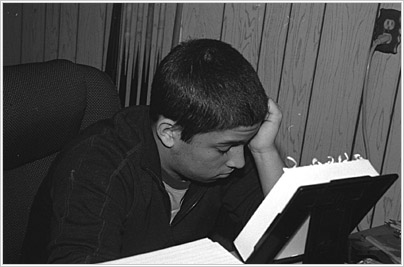 |
 | ||||

|
||||
The parents of Erin, Eric, and Athena say, at first, they felt comforted by doctors and teachers who assured them their kids would grow out of their volatile behavior. "'This is all normal stuff, relax, you are older parents with only child, you're highly educated, you're being over-protective.' Sometimes the message felt like, 'Get a life,'" says Conni Rancke, Eric's mom, but became convinced it was more than that. "He was doing things like, it sounds silly, stabbing himself in the stomach with pencils in school. And saying to the nurse, 'I just want to die.' I mean clearly, he was suicidal." "She didn't want to go to school," says Mary Rinaldo, Athena's mom. "She was in first grade. She said she didn't want to go to school. She said she was going to kill herself if I sent her to school. So she ended up in the hospital. The doctor then diagnosed her ADHD and the anxiety disorders." "I was not looking necessarily for a diagnosis, but when we got a diagnosis, we felt like at least maybe now we know what to treat," says Sherry. "So on one hand, it was a little bit of a relief, and then you realize, 'My daughter's got a mental illness.' And you know, that kind of hits you in the gut." One of the first doctors to identify bipolar in children was Harvard-based psychiatrist Linda Zamvil. "I think people just kind of thought I was a funny doctor," says Zamvil. In the early 1980s, Zamvil decided that many kids previously thought to have attention deficit disorder, substance abuse problems, or unusually irritable behavior should be diagnosed as bipolar instead. This raised some eyebrows among her peers. "People feel that it's like a curse, and that children are in the midst of their development, and it's unfair to label them - to give them a diagnosis like this," says Zamvil. "And I feel on the contrary, that it's better to say, 'This is what this is,' and identify that this is an extremely high risk population. These are the kids who hurt themselves. They drive fast, they drink, they drug, they get pregnant, and wind up in Department of Social Services and lock ups." Zamvil's approach is much more common now. In fact, some say the pendulum is swinging the other way and doctors should be careful not to over-diagnose bipolar illness. That's why Dr. Barbara Geller, a child psychiatrist at Washington University in St. Louis, is developing a clinical checklist for the adult and childhood versions. "Adults who are depressed stop enjoying life," says Geller. "A housewife stops cleaning the house. A person at work can't keep up. People don't get good sleep. They feel guilt ridden. And then they have the other side: they're the life of the party, they start grandiose business schemes." So the question Geller faced was, "What's the equivalent of those symptoms in a child?" "A young child may unexpectedly start having very flirtatious behavior," says Geller. "A young child may not start business schemes, but a young child can very grandiosely go up to the school principal and say, 'I don't like such and such teacher, you really have to fire them.' They act as if it's the day they're going to Disneyland, or as if it's Christmas morning, but they act this way every day." |
||||
|
Continue to part 2 |
||||
